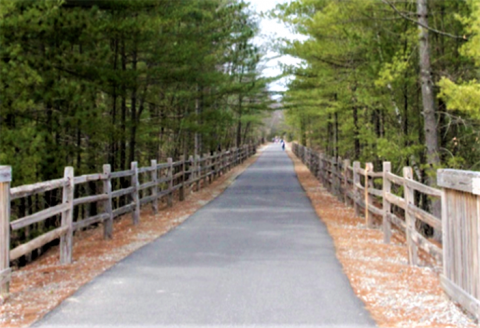Dispatches from New Hampshire rail trails-Learning how residents and visitors value our state-owned rail trails

This summer, I’ve spent my time working with my mentor, Dr. Shannon Rogers, on th e New Hampshire Rail Trails Economic Impact Analysis Survey. This survey is conducted to grant some insight into how the over 30 rail trails in New Hampshire are used and valued. It asks questions regarding spending which will later be used in an economic impact analysis. This analysis is part of a larger study for the NH Department of Transportation on the State-Owned Rail Trails. An economic impact analysis measures new spending that flows into a community due to an event or attraction, giving some insight into how the attraction in question contributes to the local economy. For more information on what an economic impact analysis is and how it can be used in community decision-making, feel free to read the Nature Economy Fact Sheet #3 that Dr. Rogers and I collaborated on.
e New Hampshire Rail Trails Economic Impact Analysis Survey. This survey is conducted to grant some insight into how the over 30 rail trails in New Hampshire are used and valued. It asks questions regarding spending which will later be used in an economic impact analysis. This analysis is part of a larger study for the NH Department of Transportation on the State-Owned Rail Trails. An economic impact analysis measures new spending that flows into a community due to an event or attraction, giving some insight into how the attraction in question contributes to the local economy. For more information on what an economic impact analysis is and how it can be used in community decision-making, feel free to read the Nature Economy Fact Sheet #3 that Dr. Rogers and I collaborated on.
While we have had some challenges in data collection due to COVID-19, we have gained some insight from an online survey conducted in April. In person surveying will hopefully return next Spring. As part of my internship, I have been working closely with the online survey results (over 1,800 responses) from late winter to early spring, and I have read every single one of our respondent’s comments! This gives me a feel for how users value the trail and what vision they have for the future of our rail trails. I have pulled out some comments below that I feel capture key themes from the comments I have read.
“This trail is a community and regional resource that helps define New Hampshire as a vacation destination and indirectly contributes to the property values of towns-regions where they are located.”
“It is a wonderful resource, and certainly one reason why I love NH (I moved here after living in Los Angeles for 10 years)”
“Love being able to get outdoors and explore NH!”
“Rail trails are an essential component to our quality of life”
Something that really stands out to me about New Hampshire is that its residents take great pride in their natural resources and communities, a kind of pride that is not found in many other places. Becoming involved in the Nature Economy of New Hampshire is a rich and rewarding experience because of the cooperation and hard work of Granite Staters, who have thus far been maintaining many of the trails through volunteer work. I would like to take this opportunity to thank all those that contribute to the Rail Trails, your dedication is admirable and appreciated by residents across the state!
This internship has been a fantastic and valuable experience, allowing me to become involved in a real-life research project in a way that many college students may not be able to. It has allowed me to grow my technical knowledge of New Hampshire, Nature Economy, and computer skills and provided an encouraging space to explore career options and make lasting connections with the UNH Community and Economic Development team. I cannot thank all those contributing to these internships enough.
Photo by Bryan Dwyer, former CED intern
